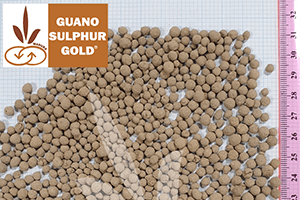Learn from agronomist Robert Drewitt BcSc(Ag) why phosphorus [P] is so important to plants and how seagull guano helps ensure minerals are plant available.
Essential Plant Minerals
Article 2 of 12 - written by Robert Drewitt BcSc(Ag) | Agronomist | Agronomy Services Australasia Pty Ltd.
© Copyright in this work is owned by Guano Australia Pty Ltd. All rights reserved.
In the last article we went over some of the long history of guano and guano mining around the world, it showed how important as a fertiliser guano was for hungry Western countries feeding increasing populations. The demand for bird guano and especially the sea bird guano from coralised island and archipelagos was increasing as the need for phosphorus as a fertiliser increased. Mono cropping and the push for ever higher yields was seeing a reduction in agricultural output. By 1872 soil testing had started and by 1894 the Chemical Society of London had published an article called “Mineral Plant Food in the Soil”. Scientists could now measure the minerals in the soil and for the first time the Agricultural Industry had a means to take the science and apply that to the soils; this saw the start of Agronomy, a branch of science.
The need for phosphorus [P] as an essential plant mineral had led to John Bennet Laws to patenting, in 1842, the first Superphosphate. He had discovered that by applying sulphuric acid to manure and observed that the b product gave quicker plant response to fertilising than manure alone. What he had discovered was the complex relationship between inorganic and organic fertiliser on crop yields.
Back to our guano story; John Laws’ work led to sulphuric acid being added to ground-up ancient guano bird deposits and as a result the modern product of Single Super Phosphate was discovered and commercialised. This fertiliser process saw a boom in factories including those near Australian on Nauru and Christmas Island.
So why is phosphorus [P] so important to plants? P is essential for all living organisms; plants require P for normal growth. It has an important role in respiration, cell enlargement, cell division, energy storage and photosynthesis. In a natural environment P comes from two sources; phosphorus salts are released from rocks by weathering and dissolved in water to be absorbed by plants and, the decay of organic matter that releases organic phosphorus, compounds the move down the soil profile and are available to plants after microbes, mycorrhizae and plant root exudates produce enzymes and organic acids that mineralize plant available P from organic and inorganic forms.
Seagull guano, in its raw state contains citric and non-citric soluble phosphorus as well as calcium and silica. The unique interaction of these minerals in the guano have a lot to do with how the mineral including phosphorus becomes plant available while not being as vulnerable to being “tied up” or leeched from the soil.

